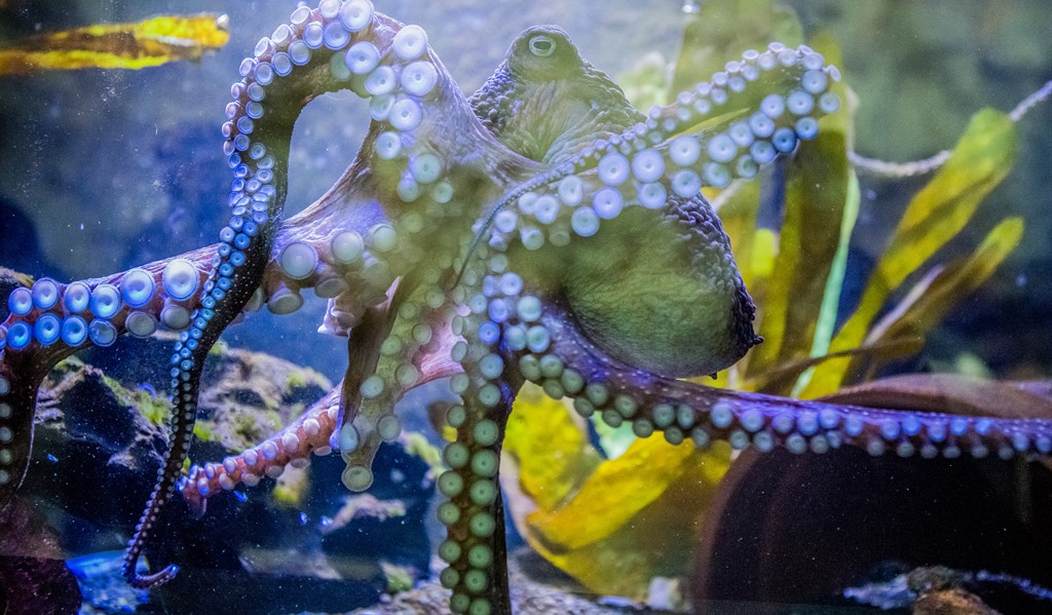Appearing alongside articles like "Proposal of fluid stirring by multi-layered trenches for liquid metal divertor," and "The global surface composition of 67P/CG nucleus by Rosetta/VIRTIS. (I) Prelanding mission phase" in Progress in Biophysics and Molecular Biology, was a curious article in 2018 that posited a theory that the octopus and other cephalopods were created by extraterrestial genetic material seeded by comets and astroids carrying them to Earth on impossibly long journeys.
Even more curious, the 33 scientists who wrote the paper —"none of whom study zoology and many of whom don’t even study anything biological," according to Popular Science — make their conclusions seem more than a little suspect.
It's not the first time that scientists have wondered whether octopuses are aliens who took one look at all the water on Earth and decided it was a fine place to move. "Location, location, location," say real estate agents. Octopusses took that advice to heart?
Actually, the 33 scientists aren't saying that octopusses got in a spaceship and flew to Earth. They're claiming alien genetic material hitched a ride on a comet or asteroid and managed to survive the journey as well as the landing impact.
The theory, known as Panspermia, would explain a lot about how life began on Earth. There are many examples of asteroids carrying proteins and other building blocks of life to Earth. So far, we have yet to find alien DNA or something similar.
Why would scientists think the octopus might be alien in origin? Because it, and its fellow cephalopods, the cuttlefish and the squid, are so darn weird.
The octopus has 33,000 protein-coding genes, 10,000 more than humans. Genes carry instructions to the body, so what do octopuses need so many genes for?
The 33 scientists examined the biological record and came to a startling conclusion: no other animal on planet Earth is remotely similar to cephalopods.
“The transformative genes leading from the consensus ancestral Nautilus [first ce […] to the common Cuttlefish […] to Squid […] to the common Octopus […] are not easily to be found in any pre-existing life form – it is plausible then to suggest they seem to be borrowed from a far distant ‘future’ in terms of terrestrial evolution, or more realistically from the cosmos at large.”
Hold the phone. In the immortal words of Defense Secretary Albert Nimziki in Independence Day, "That's not entirely accurate."
“There’s no question, early biology is fascinating – but I think this, if anything, is counterproductive,” Ken Stedman, an American virologist and professor of biology at Portland State University, told the news website ‘Live Science’. “Many of the claims in this paper are beyond speculative, and not even really looking at the literature.”
William Gilly, a biologist specializing in cephalopods at the Hopkins Marine Station of Stanford University, told Popular Science that “To be truthful, this paper seems to be so badly written and full of misleading statements that I cannot believe that it passed peer-review in any respectable journal.”
There they go spoiling all the fun again.
The Panspermia theory is hardly dead. There is tantalizing evidence that some Martian rocks that were catapulted off the planet by a meteor strike and made it to Earth might contain the fossils of ancient bacteria. The ALH84001 meteorite, containing controversial worm-like structures, was thought to be so significant that President Bill Clinton announced the NASA finding from the Rose Garden.
Later analysis and the general scientific consensus are that it doesn't indicate life at all. The strange formations are the result of volcanic activity and not life.
But whether the Panspermia theory proves out or not, octopuses are one weird creature.
Octopuses have literal blue blood. "Octopuses said ‘no, thanks’ to iron blood, though, and swapped in a copper-based protein that binds oxygen instead. It’s more efficient than iron in the cold, low-oxygen environments that most octopuses live in," says Popular Science.
It gets weirder.
Octopuses’ brains are in their arms, which is admittedly pretty odd. Two-thirds of an octopus’ neurons reside in the long appendages that many mistakenly call “tentacles” (in modern zoology, a “tentacle” is relatively long and thin, with some kind of clubbed end). This decentralized way of thinking means that even severed arms can “think” for themselves, or at least respond to physical stimuli and try to escape whatever is trying to eat them, which is why people die from trying to swallow live octopus arms only to find that the arm is still fighting back (a reported six people die this way on average each year in South Korea, where the dish is popular).
Octopuses are also incredibly intelligent.
"Octopuses regularly use tools, solve puzzles, and generally cause mayhem by sneaking in and out of their enclosures. They also sometimes accessorize by hopping inside old coconut shells and using them as little mobile homes, all while looking more stylish than most humans," writes Popular Science.
Octopuses have one major drawback: they don't live long. Most live about six months, some for a few years. The males die after mating, and the females shortly after giving birth.
That's probably why they haven't taken over the world from us yet.









